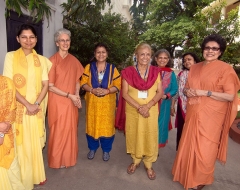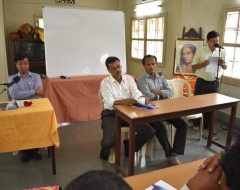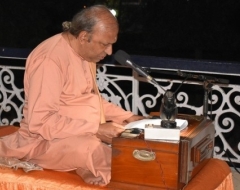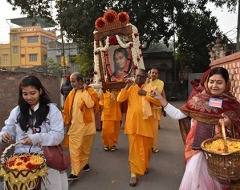In keeping with one of the aims of Yogoda Satsanga Society of India (YSS): "To serve mankind as one's larger Self," YSS Dakshineswar Ashram has been engaged in various charitable activities and relief works in the vicinity of the ashram and in the nearby areas, as well as across various regions of West Bengal over the last few decades. One of the areas of charitable help to the underprivileged includes operation of free homepathy clinics that provide medical assistance through qualified homeopathic doctors and dispensation of free medicines.
The doctors and compounders of the 23 homeopathy clinics run by YSS Dakshineswar Ashram converged for an one-day conference on ‘Homeopathic Treatment of Bronchial Asthma’ at Dakshineswar on July 3, 2018. The conference was organized by the Homeopathy Department of Dakshineswar Ashram functioning under the guidance of Brahmachari Shreyanandaji.
At the outset, Brahmachari Achyutanandaji, monastic-in-charge of YSS Dakshineswar Ashram, set the tone of the seminar by stating that several decades ago, Gurudeva Sri Sri Paramahansa Yogananda had stated that a day will come when disease will be treated primarily by energy and life force. He pointed out that today homeopathy is gaining increasing importance and acceptance as doctors have come to realize that mere treating of symptoms will not cure a patient.
The three resource persons for the conference Dr. R. N. Ghosh, Dr. Avijit Nayak and Dr. B. D. Mishra presented and elaborated on various aspects of the homeopathic approach toward treatment of a diseases with particular reference to bronchial asthma.
It was stated that unlike in allopathy, the homeopathic approach treats the patient, not the disease. The patient record is compiled meticulously so that the disease symptoms and the patient symptoms can be studied for analysing a totality of symptoms before suggesting a constitutional remedy.
Dr. Ghosh mentioned that the better the nervous system of a person, the better is their power of immunity. He added that meditation helps immensely in developing the nervous system.
While Dr. Nayak elucidated on some very interesting case studies regarding patients treated by him, Dr. Mishra discussed at length factors such as the different allergens and family history which are responsible for inducing bronchial asthma.
The conference sessions were moderated by renowned homeopathic physician Dr. Sushanta Saha. He brought out the richness of his experience in homeopathic practice and explained in detail the various types of asthma, the different allergy tests, and the concept of miasms, both acute and chronic, which is the building principle of homeopathy.
Dr. Saha laid special emphasis on maintaining the complete case histories of patients so that these become the subject and material for research and learning.
Speaking on the occasion, both Swami Nigamanandaji and senior YSS devotee, Sri Sital De enunciated on the principles of energy and life force as propounded by Gurudeva. It was accepted that homeopathic medicine has far greater scope in influencing the various facets of the mind as compared to allopathy and is now being prescribed even by allopathic doctors under certain conditions.
However, it will be the level and intensity of life force and energy inside a person that will be ultimately responsible for treating a person. This is the new horizon being approached by the new age doctors who are working with artificial intelligence and nano-medicines.
The conference had a lively question-and-answer session where different doctors and compounders raised questions related to treatment and practice which were ably answered by the resource persons and skilfully moderated by Dr. Saha.
A separate orientation programme on service and clinic maintenance was organized during the first half for compounders serving in various YSS charitable clinics in West Bengal. It was conducted by one of the experienced staff members of YSS homeopathy unit Sri Prabir Jena. In the second half, the compounders attended the question-and-answer session of the conference.
In total, 21 doctors and 31 compounders attended this programme. Eleven volunteers from various YSS Kendras in West Bengal also spontaneously came forward to attend this programme.




